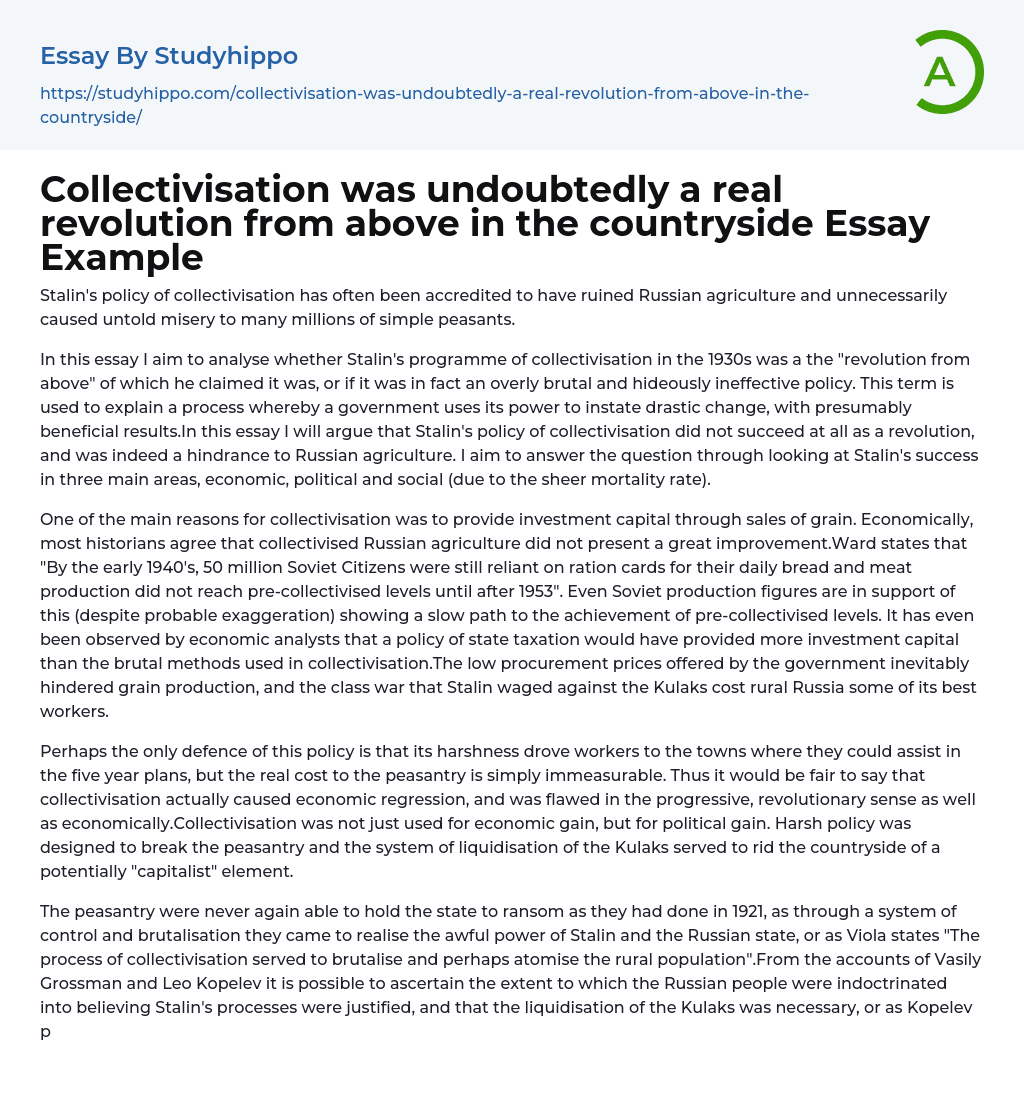

Collectivisation was undoubtedly a real revolution from above in the countryside Essay Example
Many millions of simple peasants were unnecessarily caused untold misery by Stalin's collectivization policy, which is widely believed to have ruined Russian agriculture.
The focus of this essay is to assess whether Stalin's collectivisation programme during the 1930s was a successful "revolution from above" as he claimed, or an excessively ruthless and ineffective policy. "Revolution from above" refers to a government utilizing its authority to enforce significant change, resulting in presumably positive outcomes. Through examining Stalin's accomplishments in the economic, political and social spheres (due to the high death toll), this essay will argue that collectivisation was not a successful revolution, but rather a hindrance to Russian agriculture.
The main reason for collectivisation in Russia was to generate investment capital through the sales of grain. However, most historians agree that collectivised
...Russian agriculture did not result in significant economic improvements. According to Ward, by the early 1940s, 50 million Soviet citizens still relied on ration cards for their daily bread, and meat production did not reach pre-collectivisation levels until after 1953. This is supported by Soviet production figures, which show a slow path towards achieving pre-collectivisation levels, despite likely exaggeration. Economic analysts suggest that a policy of state taxation could have provided more investment capital than the brutal methods used in collectivisation. The government's low procurement prices also hindered grain production, and the class war that Stalin waged against the Kulaks resulted in rural Russia losing some of its finest workers.
It could be argued that the only justification for the harshness of the policy was that it encouraged workers to move to the cities and contribute to the five year plans. However, th
impact on the peasants cannot be quantified and it is therefore fair to say that collectivisation resulted in economic regression and was both flawed from a progressive, revolutionary standpoint and economically. The policy was not solely focused on economic benefits, but also political gains. The severity of the policy aimed to weaken the peasantry, while liquidising the Kulaks helped eliminate a potentially "capitalist" element from rural areas.
According to Viola, the process of collectivisation served to brutalise and possibly atomise the rural population, preventing them from holding the state hostage like they did in 1921. Vasily Grossman and Leo Kopelev's accounts suggest that the Russian people were heavily indoctrinated into believing Stalin's actions were necessary in liquidating the Kulaks and achieving the universal triumph of Communism. However, this victory is only relative as it ultimately proved counterproductive. In fact, many peasants would squander their food instead of giving it up to the state, as Sholokhov alludes to, and some even welcomed the Nazi invasion in 1941.
In addition to the destruction of the Kulaks, whom Stalin was eager to eliminate despite many being simply prosperous peasants, the consequences of his actions ultimately compounded severe economic conditions. While Stalin's political goals were achieved, his methods hindered the collectivization process economically by deporting or executing skilled individuals who refused to join collectives. The estimated death toll of collectivization ranges from six to twenty million, which is an inexcusable disregard for human life. Such mortality rates are even worse than "the Great Purge or any of the famines during the Tsarist Period" (Gordon), making clear that no real revolution was achieved. It is particularly alarming to consider that many of
the famines were essentially engineered by Stalin as a result of importing already scarce grain, and that they were even worse than those experienced during the Tsarist period.
Despite the widespread belief that life in the Collectivist era was uncomfortable, some argue that there were efforts to improve conditions. These included establishing cri?? ches for the children of female workers as well as providing literacy classes for women. It's important to note, however, that attendance to these classes was mandatory and absences were met with harsh punishment. Therefore, it can be concluded that Stalin's attempts at a revolution from above may have had political gains, but ultimately led to the economic downfall of the Russian peasantry. In other words, collectivisation was seen as an undeniable disaster.
- Activism essays
- Communism essays
- Conservatism essays
- Liberalism essays
- Marxism essays
- Nationalism essays
- Patriotism essays
- Policy essays
- Public Policy essays
- Social Contract essays
- Socialism essays
- Totalitarianism essays
- Ambition essays
- Anger essays
- Betrayal essays
- Boredom essays
- Confidence essays
- Courage essays
- Desire essays
- Disgrace essays
- Doubt essays
- Empathy essays
- Fairness essays
- Fear essays
- Feeling essays
- Forgiveness essays
- Grief essays
- Guilt essays
- Happiness essays
- Harmony essays
- Hate essays
- Honesty essays
- Honor essays
- Hope essays
- Humanity essays
- Inspiration essays
- Kindness essays
- Laughter essays
- Loneliness essays
- Lost essays
- Loyalty essays
- Need essays
- Passion essays
- Pressure essays
- Pride essays
- Regret essays
- Respect essays
- Responsibility essays
- Sarcasm essays
- Shame essays



